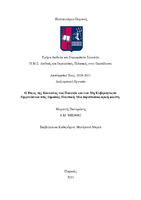| dc.contributor.advisor | Μενδρινού, Μαρία | |
| dc.contributor.author | Μύρωτης, Παναγιώτης | |
| dc.date.accessioned | 2021-12-22T15:40:42Z | |
| dc.date.available | 2021-12-22T15:40:42Z | |
| dc.date.issued | 2021 | |
| dc.identifier.uri | https://dione.lib.unipi.gr/xmlui/handle/unipi/14004 | |
| dc.identifier.uri | http://dx.doi.org/10.26267/unipi_dione/1427 | |
| dc.description.abstract | Η συγκεκριμένη διπλωματική αποτελεί μια μελέτη περίπτωσης, στην οποία μελετάται ο τρόπος με τον οποίο οι ΜΚΟ, επηρεάζουν και δραστηριοποιούνται στην χάραξη των δημοσίων πολιτικών. Επιπλέον δίνεται ιδιαίτερη έμφαση στον τρόπο με τον οποίο επηρέασε η παγκοσμιοποίηση την διαμόρφωση της δημόσια πολιτικής από τις εθνικές κυβερνήσεις, αλλά και στον αντίκτυπο που είχε αυτή η νέα συνθήκη στην δράση των ΜΚΟ. Συγκεκριμένη αναφορά γίνεται τόσο στο τρόπο με τον οποίο δραστηριοποιούνται οι ΜΚΟ στο πλαίσιο της Ε.Ε., δηλαδή στο πώς βρίσκουν δίοδο στα ανώτερα όργανα για να εκφράσουν τις θέσεις και τους προβληματισμούς τους , όσο και για το εάν και σε ποιες περιπτώσεις καταφέρνουν να επηρεάσουν την ατζέντα και την λήψη αποφάσεων στο κορυφαίο επίπεδο της πολυεπίπεδης διακυβέρνησης. Η πολιτική στην οποία εστιάζει η παρούσα διπλωματική είναι η εκπαιδευτική και η μεταναστευτική πολιτική. Η τελευταία έχει επανέρθει σε περίοπτη θέση στην ατζέντα, μετά την προσφυγική κρίση που ξέσπασε ως επακόλουθο της δεκάχρονης, πλέον, Συριακής κρίσης. Η εκπαίδευση των προσφύγων είναι σημαντική, για την πλήρη ένταξή τους στην κοινωνία των κρατών που διαμένουν. Όμως ποια είναι η συμβολή των ΜΚΟ σε αυτή την διάσταση της κρίσης; Στο τελευταίο μέρος της εργασίας εξετάζεται η δραστηριότητα των ΜΚΟ στην Τουρκία σχετικά με την προσφυγική κρίση, ενώ στα προηγούμενα κεφάλαια η εργασία εστιάζει στην συμμετοχή των ΜΚΟ στην Ανοιχτή Μέθοδο Συντονισμού, για την διαμόρφωση της στρατηγικής της Λισσαβόνας από την Ε.Ε, καθώς επίσης και στον ρόλο που έχουν οι ΜΚΟ στην Αφρική σχετικά με την παροχή εκπαιδευτικών υπηρεσιών, αλλά και στο τρόπο με τον οποίο επηρεάζουν τις κυβερνήσεις στην διαμόρφωση της εκπαιδευτικής πολιτικής. Στα πρώτα κεφάλαιο γίνεται μια αναφορά στις βασικές έννοιες της δημόσιας πολιτικής και ο συσχετισμός του όρου δημόσια πολιτική με την εκπαιδευτική πολιτική. Ακόμη γίνεται μια προσπάθεια περιγραφής της δράσης των ΜΚΟ σε επίπεδο διεθνών οργανισμών, ενώ στην συνέχεια εξειδικεύεται η δράση τους γενικότερα στο πλαίσιο της εκπαιδευτικής πολιτικής. | el |
| dc.format.extent | 63 | el |
| dc.language.iso | el | el |
| dc.publisher | Πανεπιστήμιο Πειραιώς | el |
| dc.rights | Αναφορά Δημιουργού-Όχι Παράγωγα Έργα 3.0 Ελλάδα | * |
| dc.rights.uri | http://creativecommons.org/licenses/by-nd/3.0/gr/ | * |
| dc.title | Ο ρόλος της κοινωνίας των πολιτών και των μη κυβερνητικών οργανώσεων στις δημόσιες πολιτικές μια περιπτωσιολογική μελέτη | el |
| dc.type | Master Thesis | el |
| dc.contributor.department | Σχολή Οικονομικών, Επιχειρηματικών και Διεθνών Σπουδών. Τμήμα Διεθνών και Ευρωπαϊκών Σπουδών | el |
| dc.description.abstractEN | This dissertation is a case study, which studies the way in which NGOs influence and are active in the formulation of public policies. Particular emphasis is placed on the way in which globalization has influenced public policy-making by national governments, but also on the impact that this new treaty has had on the action of NGOs. Specific reference is made both to the way in which NGOs operate within the EU, and how they find a way to the higher institutions in order to express their positions and concerns, as well as whether and in which cases they manage to influence the agenda at the top level of multilevel governance. The policy that this diplomacy focuses on is education and immigration policy. The immigration policy has returned to a prominent place on the agenda, following the refugee crisis that erupted as a consequence of the now ten-year-old Syrian crisis. The education of refugees is important for their full integration into the society of the countries in which they live. But what is the contribution of NGOs to this dimension of the crisis? The last part of the paper examines the activity of NGOs in Turkey related to the refugee crisis, while in previous chapters the work focuses on the participation of NGOs in the Open Method of Coordination, for the formulation of the Lisbon strategy by the EU, as well as and the role of NGOs in Africa in providing educational services, but also in the way they influence governments in shaping education policy. In the first chapters a reference is made to the basic concepts of public policy and the correlation of the term public policy with educational policy. Another attempt is made to describe the action of NGOs at the level of international organizations, while then their action in general in the context of educational policy is specialized. | el |
| dc.contributor.master | Διεθνείς κι Ευρωπαϊκές Πολιτικές στην Εκπαίδευση, Κατάρτιση και Έρευνα | el |
| dc.subject.keyword | Μ.Κ.Ο. | el |
| dc.subject.keyword | Εκπαιδευτική πολιτική | el |
| dc.subject.keyword | Δημόσια πολιτική | el |
| dc.subject.keyword | Παγκοσμιοποίηση | el |
| dc.subject.keyword | Πολύ-επίπεδη διακυβέρνηση | el |
| dc.date.defense | 2021-12-13 | |



